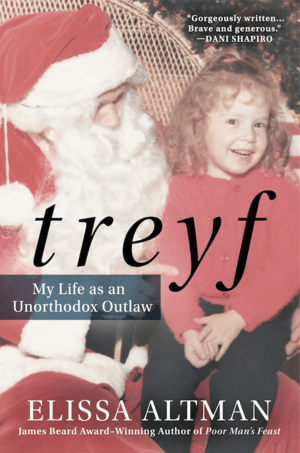A Pious Longing
It was a compulsion, a need, a desire so thick that it coated my tongue like halvah; even now, at moments when I least expect it, it creeps up on me and demands my attention, my need for acknowledgement as the pious woman I like to believe I am.
Every late Sunday morning, I stood behind him at his oilcloth-covered kitchen table while my grandmother puttered silently around her white Chambers stove; every late Sunday morning, I longed for his love, his approval, his understanding of the fact that out of all of his grandchildren—there were three of us; all girls—I was the devout one. My devotion, I was sure, would feed his heart and save him from a deep, relentless sadness that seemed so ancient; it would lash us together, generation to generation, soul to soul.
On warm Sundays, the kitchen window over the fire escape was thrown open and I could see the Coney Island parachute drop looming in the distance. On cooler Sundays, the radiator under the window spat and hissed like a steam engine. But regardless of heat or chill, I hovered over my grandfather’s bony shoulder and dangled my child-jewels in his ancient face while he sipped his tea from a bone china cup dragged over by his mother-in-law on the ship from Czernowitz eighty years earlier. It was the summer of 1971, and the world everywhere was on fire: the jewelry of my faith, I was sure, was a physical representation of the devotion that would guarantee his love for me. And love and faith, I imagined, would ground me, save me, lodge my feet in the promise of the Matriarchs and the Patriarchs. We are direct descendants of King David, my father would say just before the beatings; I shut my eyes tight and imagined my Orthodox grandfather wearing a jeweled crown and chain mail and a St. George’s Cross like King Arthur from the Classics Illustrated Comics. So you’d better behave yourself.
That summer of 1971, my parents gave me a birthday present of a heavily filigreed chai, which all the Jewish girls I knew were wearing. A few months later, there was a yellow gold Mogen David given to me by a non-Jewish neighbor with whom my mother immediately broke ties. A little while after that, my father came home with a tiny white cardboard box containing a slender, inch-long mezuzah hanging off a long tarnished rope chain. Meant for a grown man, it hung straight down the center of my chest and rested somewhere between my navel and the bronze snap on my Wrangler’s.
One by one, every Sunday morning, I held them up just inches from the tip of my grandfather’s nose and swung them back and forth like a hypnotist.
Every time, he just shook his head and sighed.
Sit down already, my father would say to me from across the table, reaching over the bowl of schmaltz herring to grab my wrist. Leave him be.
Vey iz mir, my grandfather grumbled before turning the conversation back to his native Yiddish. Who wears a mezuzah around the neck?
On the baby grand piano in the living room a few feet away, there were formal pictures of my older cousins at their Bat Mitzvahs held on post-war Long Island before I was born: one Bat Mitzvah in 1959, the other in 1961. I was the family baby, born in 1963, and conspicuous by my absence; in my grandparents’ Brooklyn apartment of my childhood, there were no pictures of me anywhere. My cousins were pretty and prim, their Siddurs held chastely against their narrow waists. But there was nothing else to define where they were or what they were doing: no tallit, no teffilin, no yarmulke. Our grandfather, who didn’t believe in girls reading from the Torah, wouldn’t have it.
So there was no other way for me to express to my grandfather—an old-school Orthodox cantor, a Talmudic scholar with a Kabbalist bent—the depth of my fervor and need for his love. The decision had been made by my father: as an assimilated American child, I wouldn’t, like my cousins, attend Hebrew school and I wouldn’t be Bat Mitzvah. But I was so utterly obsessed with establishing my piousness and pleasing my direct-descendant-of-King-David grandfather that I had to find a way show it: it was jewelry, or nothing.
He doesn’t approve, my father said to me across my grandfather’s breakfast table. He pulled my chair back and patted the red leatherette seat.
I sat down and tucked the mezuzah inside my tee-shirt.
I don’t understand, Schmuel, my grandfather said to his son, nodding over to me. Why don’t you try for a boy?
My father responded in a Yiddish mumble; I couldn’t hear him, and even if I could, I would never understand his words.
We mask our needs as the needs of others, Terry Tempest Williams writes in When Women Were Birds, her book about matriarchy and memory, and the search for one’s voice. I no longer wear the jewelry of my faith, the trinkets that I was certain my grandfather needed to see if he was to truly love me, and as proof of my devotion to him and to an ancient lineage from which I had been disconnected over time and circumstance, patriarchy and assimilation. I search, instead, for meaning and faith devoid of hyperbole and violence, for understanding who and what I am as I peer tentatively into my past and attempt to unravel it. It is holy work; it informs my present; it seeds and waters it, like a garden.
Elissa Altman is the award-winning author of the memoir Treyf: My Life as an Unorthodox Outlaw, and the critically-acclaimed memoir Poor Man’s Feast: A Love Story of Comfort, Desire, and the Art of Simple Cooking.







